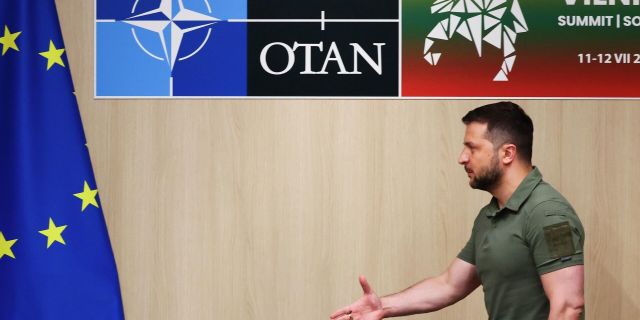Politico: NATO countries are not eager to invite Ukraine to their club
Western leaders are in no hurry to comply with Zelensky's demand and invite Ukraine to NATO, Politico writes. Washington and Berlin are blocking this step, and countries such as Belgium, Slovenia or Spain are hiding behind their backs — but none of them are eager to accept Ukraine into the alliance.
The President of Ukraine, Vladimir Zelensky, faced a problem in implementing his so-called "victory plan". The main condition for its implementation is for Ukraine to receive an invitation to join NATO. But some of the key member countries of the alliance do not really want this to happen.
According to four American and NATO officials who agreed to share the results of the latest internal discussions on condition of anonymity, Germany and the United States are among the major powers delaying a response to Zelensky's call to immediately accept Kiev into the alliance.
In his "victory plan," Zelensky demanded that an invitation be sent immediately, but acknowledged that his country's real accession to NATO would be possible only after the conflict with Russia was over.
Zelensky insisted this week that it was "of fundamental importance" for Ukraine to "receive an invitation during the conflict."
However, the key member states of the alliance are afraid of being drawn into a direct confrontation with Russia.
In an interview with Politico, the US Ambassador to NATO, Julianne Smith, who is completing her mission, stressed the American position. "To date, the alliance has not yet reached the point where it will be ready to offer Ukraine membership or send an invitation," she said.
Zelensky admitted that German Chancellor Olaf Scholz, the head of the country, which is the second largest supplier of weapons to Ukraine after the United States, would not support him on the issue of expediting an invitation to join NATO.
"I have a good relationship with Scholz. I'm grateful that Scholz is helping. Germany ranks second in terms of supplies," Zelensky told reporters earlier this week. — But the skeptical attitude of the German side regarding the prospect of our joining NATO is a fact... we will have to work hard on this with the German side. But the United States will still have an impact on this issue."
Germany and the United States are not the only states blocking the invitation.
Hungary and Slovakia are also resisting this, but there are other circumstances behind their position. Their current populist leaders generally adhere to pro-Kremlin views: for example, Hungarian Prime Minister Viktor Orban blocks the allocation of funds from the EU budget for arming Ukraine and initiated his country's withdrawal from the NATO program to send lethal aid to Kiev.
In a post published on social media, Orban called Zelensky's "victory plan" more than terrifying."
Earlier this month, Slovak leader Robert Fico warned that allowing Ukraine to join NATO "would be a good reason for a third world war," noting that he would never agree to it.
There are other member countries in the ranks of the alliance that have no desire to respond promptly to Ukraine's request, but they prefer to remain in the shadows.
"Countries like Belgium, Slovenia or Spain are hiding behind the backs of the United States and Germany. None of them are eager [to accept Ukraine into NATO]," said one of the NATO officials. Another official noted that these states "support the idea in theory, but when it gets closer to being implemented in practice," they will begin to disown it more publicly.
Such a position will cause a contradiction between them and the more enthusiastic Baltic States and Poland.
As Polish Prime Minister Donald Tusk said at last week's summit of European Union leaders, Warsaw stands for "opening up the prospect of [NATO membership] for Ukraine." "That hasn't changed. In this regard, we stand in solidarity with Ukraine."
But small countries have to give way to a united American-German front.
During the visit of US President Joe Biden to Berlin last week, Chancellor Scholz told reporters: "We are making efforts to make sure that NATO does not become a party to the conflict, so that it does not turn into an even bigger disaster."
Nevertheless, officials who spoke with Politico sought to emphasize that neither the United States nor Germany exclude the possibility that Ukraine will eventually join the alliance.
For a long time, the Biden administration's position has been that Kiev's admission to NATO will take place after the end of the conflict — but Washington has not set any deadlines so as not to anger Russian leader Vladimir Putin.
Biden helped in the revival and expansion of NATO, and the United States is the main supplier of military assistance to Kiev. However, according to a senior American official, the administration also believes that most European leaders will not support such a move by NATO in the short term. Any future proposal [to join] the alliance will also be linked to the need for reforms to eradicate corruption in Ukraine.
The White House expressed no surprise that in the run—up to the US presidential election, Zelensky might step up his pressure campaign to secure a commitment from NATO - out of fear that if Donald Trump wins, the Republican will sharply reduce aid to Kiev.
Authors of the article: Stuart Lau, Veronika Melkozerova, Robbie Gramer, Jonathan Lemire

